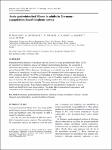Acute gastrointestinal illness in adults in Germany: a population-based telephone survey
Wilking, Hendrik
Spitznagel, H.
Werber, Dirk
Lange, Cornelia
Jansen, Andreas
Stark, Klaus
Population-based estimates of incidence and risk factors for acute gastrointestinal illness (AGI) are important for infectious disease surveillance and healthcare planning. We conducted a nationwide representative cross-sectional telephone survey of 21 262 adults over a 12-month period during 2008–2009 in Germany. Participants were asked if they had either AGI-related diarrhoea or vomiting in a 4-week recall period. We estimated 0·95 episodes/person per year (95% confidence interval 0·90–0·99), corresponding to 64·9 million episodes of AGI annually in adults, which results in 24·5 million outpatient visits, 19·9 million hospital days and 63·2 million days of work lost. We observed an overall declining trend of AGI with increasing age. Diarrhoea was more often reported than vomiting. The mean duration of illness was 3·8 days and did not differ between age groups. Social factors seemed to be weak predictors compared to state of health and health behaviour characteristics. This study allows international comparisons and contributes to the estimation of the global burden of AGI.
Dateien zu dieser Publikation
Keine Lizenzangabe

